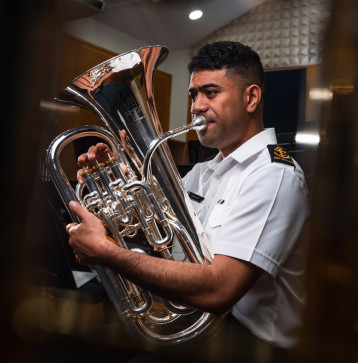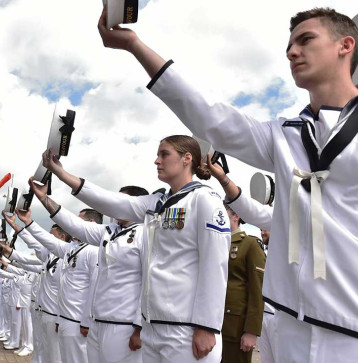
Reserve Musician
Skip to section:
About the role Career progression and training Salary Entry requirementsGet the best of both worlds: balance your everyday work or study with the excitement and adventure of life in the Navy. Embark on a part-time career like no other by joining the Royal New Zealand Navy Band. It includes some of the country’s finest musicians who perform at a wide range of ceremonies and events.
- ServiceNavy
- SpecialisationNaval Reserve
- LocationAuckland
-
Initial daily rate$176
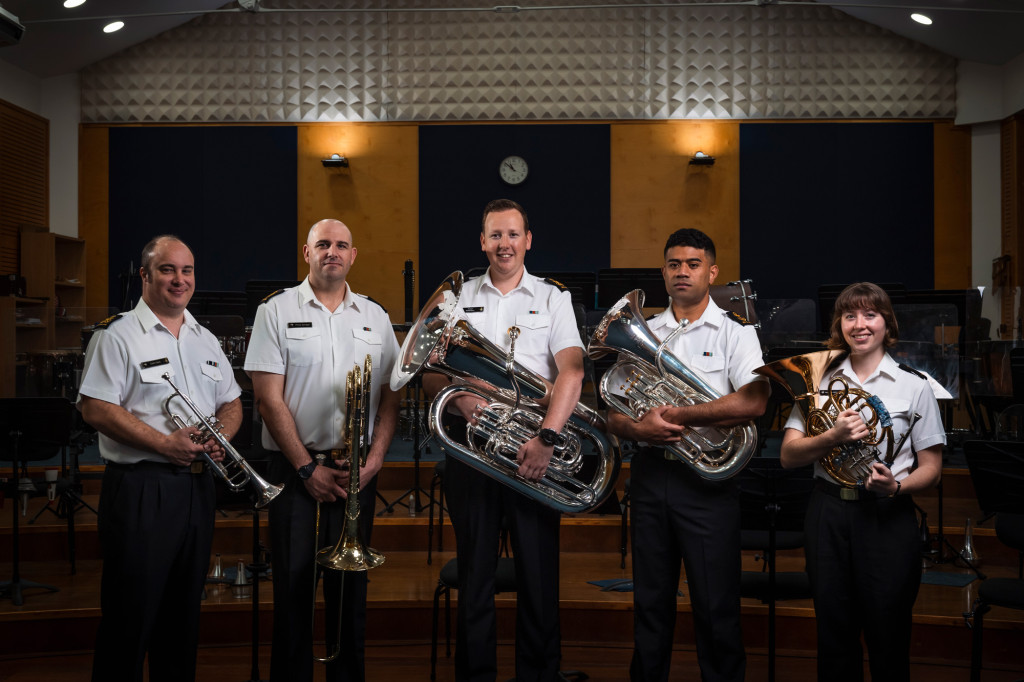
About the role
Musicians in the Navy are full- or part-time professional band members. The band’s key role is the responsibility to deliver musical support to the NZ Government, NZ diplomatic interests within Aotearoa or abroad and support the RNZN Mission. This is achieved through the following:
- Support to state ceremonial
- Defence diplomacy
- Command support to Navy personnel, its ships and families
- Public relations
- Community engagement
- Recruiting
- Moral component, providing entertainment for Navy and wider NZDF
The RNZN band is unique as the only full-time professional military band in New Zealand; but not every event involves marching. Reserve Musicians may play with the full concert band, independently, or with one of the band’s various ensembles, including:
- Big band
- Brass quintet
- Jazz group
- 2nd line
- Dixie band
- Saxophone quartet
Career progression and training
Training overview
Time commitment
BASIC TRAINING - BCT
JOB TRAINING - MUSICIAN
CAREER PROGRESSION
During your first eight months in the Navy, you will be taught core military and mariner skills, in order to be an effective rating in the Navy.
Basic Training – Basic Common Training: This initial training is known as Basic Common Training (BCT) and begins with nine days at Devonport Naval Base and the Tamaki Leadership Centre in Whangaparaoa.
Job Training: On completion of BCT you will embark on your career with the RNZN Band. While undertaking “on the job” training, you will be expected to complete the Able Musician task book, which confirms your proficiency as a musician for your first promotion.
Ongoing Career Progression: You will be eligible for promotion to Able Musician once you have completed 18 months’ effective service, the Sea Qualifying Damage Control course, and the Able Musician task book. As your career progresses, your hard work, experience and training accomplishments as a Musician and on Navy development courses are rewarded by promotions in rank and salary.
Course dates will be advised by your Candidate Engagement Facilitator as part of your recruitment journey.
After initial training, Reservists commit to a minimum cumulative total of 20 days’ service each year for professional development and operational delivery. This is made up of a minimum of 14 days of full-time training, exercises, operational activity and/or supplementation to the Regular Force plus weeknight and weekend training (which may include Friday evenings). An additional 20 days is available for supplementary activities that benefit both individual Reservists and the NZDF.
Naval Reservists receive an hourly rate of pay, up to a maximum of eight hours per day, commensurate with their rank and experience. This also encompasses travel time required to attend training.
During your first eight months in the Navy, you will be taught core military and mariner skills, in order to be an effective rating in the Navy. This initial training is known as Basic Common Training (BCT) and begins with nine days at Devonport Naval Base and the Tamaki Leadership Centre in Whangaparaoa.
BCT continues once you return to your home Reserve unit, with weekend training once a month, one evening of training each week, and self-study. BCT finishes with four days of experiential training in August.
Reserve ratings receive the same initial training as their Regular Force counterparts. This includes parade training (drill), an introduction to the laws of armed conflict, first aid, naval customs and ceremonies, communications, an introduction to damage control, and small arms.
Following completion of Basic Common Training, you will begin “on the job” training with the RNZN Band as an Ordinary Musician (OMUS). You will also start the Able Musician task book, which is your professional qualification for promotion to Able Musician.
Professional training for promotion to Able Musician, Leading Musician and Petty Officer are through the completion of task books which assess your retained knowledge and competence in the required skills. The professional qualification for promotion to Chief Petty Officer and Warrant Officer is the successful completion of a course with the Royal Marines Band Service (UK).
Your hard work, experience and training accomplishments as a Musician are rewarded by promotions and increases in salary.
You will be eligible for promotion to Able Musician once you have completed 18 months’ effective service, the Able Musician task book, and one Regular Force course: Sea Qualifying Damage Control (two weeks).
Further promotions are based on merit, efficient time at each rank, the completion of the required task book or professional course, and completion of the development (leadership) course at each level.
It is a requirement for all promotions that you be medically and physically fit. For promotion to Leading Musician, Petty Officer, and Chief Petty Officer, you must also be approved for promotion by the Naval Ratings Promotion Board.
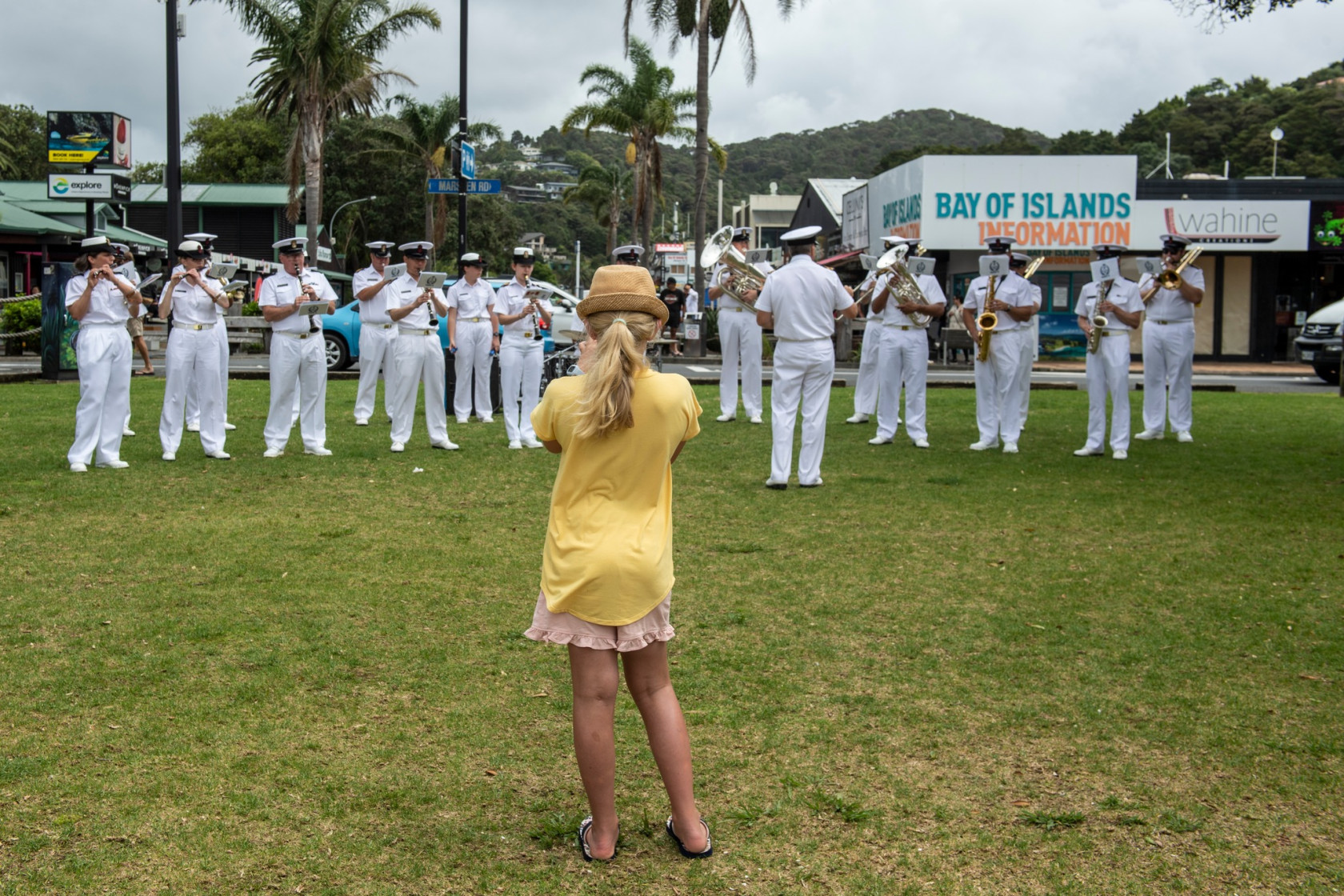
Salary
Naval Reservists receive an hourly rate of pay, up to a maximum of eight hours per day, commensurate with their rank and experience. This also encompasses travel time required to attend training.
As a Reserve Musician, the minimum remuneration you will be paid is a daily rate of $175.90, plus an allowance for holiday pay. Your pay will increase as you move up through the ranks.
$176
Initial daily rate
Entry requirements
Basics
EDUCATION AND EXPERIENCE
FITNESS AND MEDICAL
CITIZENSHIP
- Be a minimum of 17 years of age upon entry.
- Be free of any criminal conviction for the previous two years.
You must have obtained at least 10 credits at NCEA level 1 in both Literacy and Numeracy.
Find out more about the NCEA levels and certificate requirements
Proficiency with instruments is the main criteria for entry as a Musician. You must be a competent performer/soloist on at least one military band instrument. A tertiary qualification is desirable but not mandatory.
Entry into the Navy Band is by audition and interview with the Director of Music (DoM) and a selected panel of senior musicians from the RNZN Band. Should this audition and interview be successful, the DoM, in conjunction with the Navy recruiters, will put forward a candidate for selection into the Navy (provided general recruitment requirements are met).
- You must be medically fit for service.
- You must meet the minimum entry fitness standards.
- Colour perception restrictions may apply.
There are strict citizenship and security requirements to gain the SV security clearance required for this trade. You must be free of any criminal convictions for the previous two years.
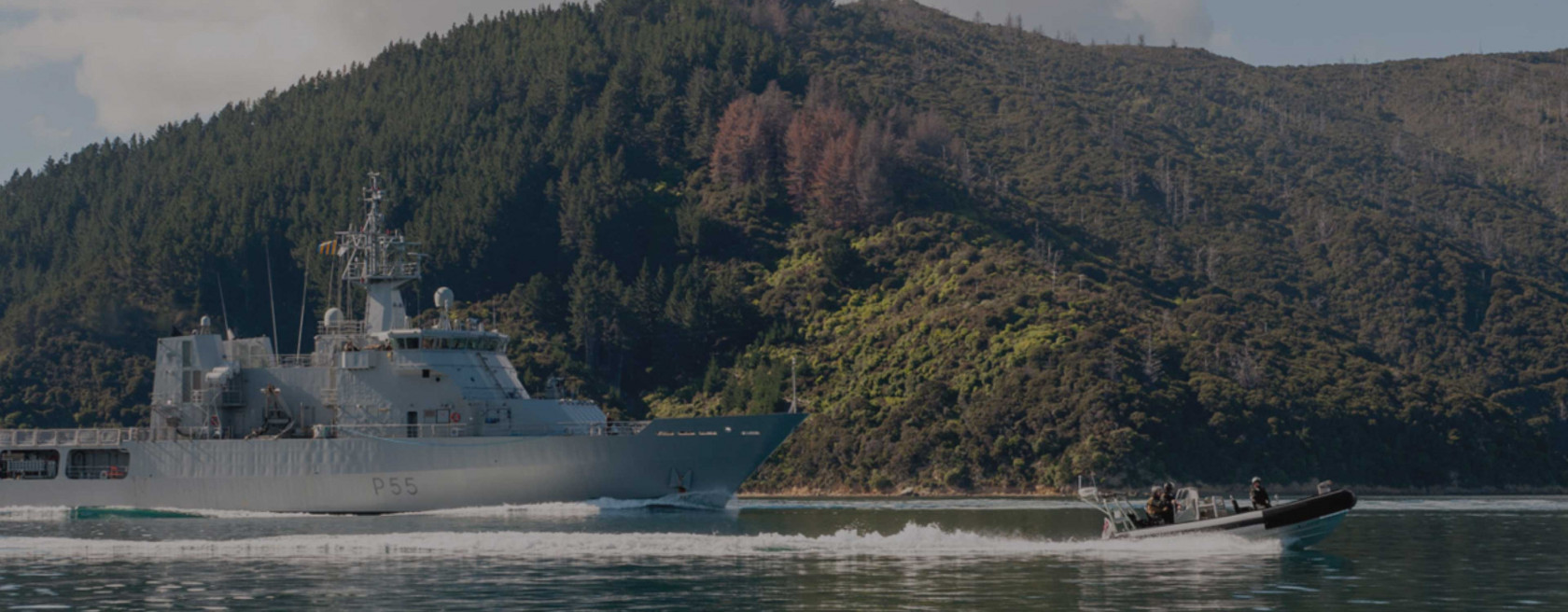
Ready to start your Navy career?
Other jobs you might like
You can also browse jobs by specialisation to narrow down your search.
